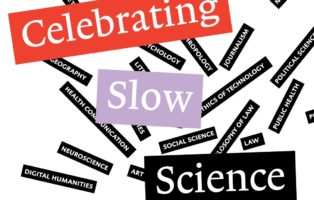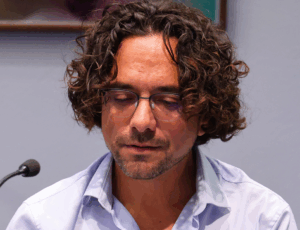
Why Do We Need Slow Science?
The corona pandemic has only deepened the paradox of slow science
Has the university turned into one of those greedy institutions (Coser 1974) which devour their own children? Alarming reports by the KNAW and WOinActie about excessive workloads, publication pressures and burnouts suggest as much. Everyone knows where the crux of the issue lies: time scarcity, lack of time autonomy. The institution tends to eat your time, and you end up being lived by it. But greedy institutions also nourish themselves on personal ‘greed’: less for money than for honour, for preserving one’s identity as an academic and making a name for oneself.
The corona pandemic has only deepened the paradox of slow science. On the one hand, lockdown is an extreme form of slowdown, enforcing a dramatic deceleration of economic growth, mobility and social gathering. But paradoxically, academic workloads have intensified even further, due to the need to zoom lectures and conducting student sessions and planning meetings via the internet. The managerial university appears resolved to keep its machinery going, unwilling to endanger its ‘throughput’ of students and its competitive research targets. The slow science message hence appears more topical than ever.
Acceleration and time wealth
‘Time wealth’ enables people to strike a better balance between work, care, education, learning, reflection and relaxation, thereby creating the conditions for a more versatile and creative life
Having sufficient free time undoubtedly counts as a felicitous ingredient of the good life. It increases in significance beyond a moderate level of material prosperity and social security. Karl Marx already identified the time freed for purposeful activities which have their end in themselves as ‘the true form of wealth’. ‘Time wealth’ enables people to strike a better balance between work, care, education, learning, reflection and relaxation, thereby creating the conditions for a more versatile and creative life.
Hence the salience of a temporal perspective on social structure and social problems, as pioneered by the sociology of time (e.g. Adam 1990; Rosa 2013; Wacjman 2015). Modernity has long been identified as the era of the ‘Great Acceleration’, and time compression as central to the spirit of capitalism. Speed has become a crucial factor of production and accumulation, accelerating by leaps and bounds via Taylorist time management and the Fordist assembly line up to contemporary just-in-time customized production and split-second financial speculation.
While Benjamin Franklin’s slogan ‘time is money’ offers an early celebration of social and economic acceleration, the most extreme political version of it is encountered in the Fascist and Nazi aesthetics of speed and war, and their cultivation of intuitive leadership, fast decision and youth (‘live fast die young’). Mussolini famously described Fascism as a ‘dynamo’; Hitler celebrated the Blitzkrieg. I don’t think it is unfair to emphasize such historic continuities between fast capitalism and the aggressive populism of the 1930s and 1940s, or – perhaps even more controversially – to notice the kinship between the fast capitalist media and the populist politics of our own day. We only have to look at Mark Zuckerberg’s motto: ‘Move fast and break things’ and the quick fix which is promised by media-driven populists such as Donald Trump.
The triad of fast capitalism, fast media and fast politics drives a generalized acceleration of life and work which increasingly threatens the slower paces of democratic deliberation, cultural education and creation. Forcing the pace of life to an homogenously accelerated tempo tendentially undermines the most crucial asset in the constitution of liberal democracy: the separation or powers, institutions and jurisdictions – which is also a separation of tempos and times. Social domains such as finance, industry, the media, the democratic polity, the arts and the university work to different timetables and facilitate different rhythms of social interaction. Defending a liberal-democratic society against the authoritarianism of speed obliges us to preserve these temporal checks and balances, not only between different social fields but also within them.
The triad of fast capitalism, fast media and fast politics drives a generalized acceleration of life and work which increasingly threatens the slower paces of democratic deliberation, cultural education and creation.
The dialectic of fast and slow
Facing this extraordinary historical challenge, it is tempting to go for a sweeping social critique which equals acceleration to alienation and advocates slowdown as a universal remedy (cf. Hartmut Rosa’s slogan: ‘Acceleration is a new form of authoritarianism’). Contemporary expressions of this critical mood are found in the Slow movements: slow food, slow cities, slow sex, slow journalism, slow politics, slow scholarship. The movement’s best known manifesto, Carl Honoré’s In Praise of Slowness, however, is not a sweeping declaration of war on speed, but defends a more nuanced position which is not shy to acknowledge its liberating features. Rather than ‘a Luddite attempt to drag the whole planet back to some preindustrial utopia’, the Slow philosophy is about balance: ‘Be fast when it makes sense to be fast, and be slow when slowness is called for. Seek to live at what musicians call the tempo giusto – the right speed’ (Honoré 2004: 15, 275).
Following this lead, ‘fast’ and ‘slow’ had better be seen as ‘essentially contested concepts’ with a definite performative and political thrust; both also display an intriguing Janus head. Like so many social phenomena, speed has two faces. Indeed, there also lurks a potential authoritarianism in slowness: in the weight of tradition, the rut of stagnation, the romance of nostalgia. Mobility, the ability to escape tradition, to break from routines, constitutes an essential part of freedom: oppression also means forcing people to stay where and to remain what they are, to go slow on change. In his intriguing study Accelerating Academia (2016), the Czech sociologist Filip Vostal seeks to avoid any one-dimensional privilegeing of either slow or fast, in order to emphasize their normative ‘duality’. Acceleration and deceleration can be both enabling and constraining, both promise and tragedy. Such a ‘dialectical’ departure opens up towards an ethics of complexity and moderation which, in everyday terms, would imply that ‘the good and the bad often sit in the same room, if not on the same chair’.
This notion of duality liberates us from totalizing forms of praise or blame for either speed or slowness. Like all essentially contested concepts and ideals (freedom, equality, solidarity), fast and slow turn bad when they are absolutized or essentialized. The idea of normative duality, by contrast, introduces an ethic of modesty and balance, of openness to positive uncertainty, without (and this needs some emphasis) undercutting our capacity to further the good and fight the bad (‘bad relativism’).
Accordingly, with all dialectical nuance entered, Vostal still heralds a critical slowdown of the over-accelerated university, not in order to abolish all fast practices within it, but specifically to de-escalate the pressures of a market- and media-driven acceleration ‘running wild’, which threatens the good work and well-being of many teachers and researchers. On the one hand, academics suffer from an increasing inability to determine their work rhythms. On the other, some forms of speed-up such as those facilitated by ict technologies (word processing, email communication, digitalized libraries, wikipedia etc.) are liberating. Speed also offers a positive dynamic and a coveted physical and psychological thrill (cf. any form of competition or conflict in sports, games, contests, polemics and debates). ‘The rat race may be killing, but racing itself may be thrilling’, as Vostal says. We for example cherish accelerative moments occuring within the otherwise unhasty tempo of research, such as brainstorming, intuitive flashes or eureka moments: Archimedes in the bathtub, Newton under the tree.
Fast and slow populism
We may briefly apply this ‘dialectical’ framework to the contemporary rise of populist politics, particularly the Trumpian White House. Like its historic predecessors, the new authoritarianism appears to thrive on acceleration. But if we look closer, Trumpian-style populism turns out to be deeply ambivalent. On the one hand, it epitomizes the highest speed of fortune and fame, the victory of fast emotions over the slower pace of reasoning, fact-finding and education, of twittering over reading books, of bluffing, lying, branding and celebrification over learning, culture and the arts. Trump personifies the decisionist, intuitive, authoritarian leader, who knows that intimidation and domination are fast, while listening to others, deliberation and respecting constitutional checks and balances are slow. His performance not only illustrates some of the intrinsic connections between speed and violence, but also the gendered nature of speed, which is traditionally associated with male dominance and aggression, while femininity is often linked to its opposite.
On the other side of the dialectic, however, Trumpist populism, in channeling a backlash against the runaway pace of neoliberal globalization, also exemplifies the revenge of the slow (the losers) on the fast (the winners). It promises security, protection, stability, and hence a systematic deceleration of economic, occupational and cultural changes which breed insecurity and anxiety for a great many citizens. It is about installing speed limiters such as protective trade barriers, building walls which must stop the flow of migrants, and defending white male-dominated cultural traditions against multiculturalism, feminization and cosmopolitanism. It is about slow and stable identities which offer much-needed anchors in the vertigo of change, such as male chauvinism, national pride, religious bigotry, suburban and rural slowness versus the rush of the metropole; perhaps also the slow pace of the elderly versus the speed of the young.
Academy and agora
Slowdown encourages a uniquely detached and different view, since unhastening permits scientists to freeze-frame, zoom in on the fine details, to take things apart and study them one by one, freed from the demands of urgency, immediacy and publicity which are imposed by more speedy cultures
If Trumpism demonstrates that lies, bullshitting and fraud are fast, and that truth, facts and nuance are slow, there might still be some traction in the basic proposition of my book Unhastening Science (2003), which identifies slower motion (let me emphasize the comparative degree) as a uniquely distinctive and valuable feature of scientific work, both as an institutionalized social domain and an internalized habitus. Recall the physical setting of the historic Platonic/Aristotelian academy, the archetype and ancestor of our modern university (and of the dialectic!), which was situated in the countryside at a distance of a few miles northwest beyond the Dipylon Gate and the Athenian agora. Today it still survives as a little green island within a rather unattractive Athenian neighbourhood called Akadimia Platonos. These scant remains of the historic academy still bear witness to the primal need for both spatial and temporal withdrawal from the hustle and bustle of the agora (which was both a market hub and a political centre). This secluded space was needed to secure an unhastened pace of walking, talking, thinking, questioning and criticizing.
My central purpose in the book, to be sure, is not to essentialize about (philosophical and scientific) truth being slow, but to make a radical point about social epistemology: science is ‘nothing special’ in terms of traditionally venerated philosophical criteria of demarcation and cognitive superiority such as truth, logic, right reasoning, disinterestedness, objectivity-as-neutrality or value-freedom – the traditional epistemological foundations of the Ivory Tower. Science, I argue, has irreparably lost its transcendental aura; it is special only as a result of the unique perspective which is yielded by its pragmatic spatial and temporal distanciation from faster practices in markets, polities and media. Slowdown encourages a uniquely detached and different view, since unhastening permits scientists to freeze-frame, zoom in on the fine details, to take things apart and study them one by one, freed from the demands of urgency, immediacy and publicity which are imposed by more speedy cultures. With laboratories racing to develop a vaccine against Covid-19, the danger of quick fixes and other shortcuts to make science dance to a political tune is increasingly apparent.
As argued above, modern societies are swept by a dominant acceleration trend which threatens time autonomy and time diversity in all its domains. Facing this historic challenge, we should not argue for universal deceleration, but for the preservation of temporal checks and balances, i.e. of multiple rhythms and temporal registers and their productive interactions. The right to choose your own times clashes with all efforts to impose synchronization, either fast or slow. Ultimately, our aim is not to be faster or slower but to become better: to attain a better quality of life.
Literature:
Coser, Lewis (1974) Greedy Institutions: Patterns of Undivided Commitment. New York: The Free Press.
Honoré, Carl (2004) In Praise of Slowness. New York: HarperCollins
Pels, Dick (2003) Unhastening Science. Autonomy and Reflexivity in the Social Theory of Knowledge. Liverpool: Liverpool University Press.
Rosa, Hartmut (2103) Social Acceleration. A New Theory of Modernity. New York: Columbia University Press.
Vostal, Filip (2016) Accelerating Academia.The Changing Structuire of Academic Time. Houndmills, Basingstoke: Palgrave Macmillan.
Wajcman, Judy (2015) Pressed for Time: the Acceleration of Life in Digital Capitalism. Chicago: The University of Chicago Press.



